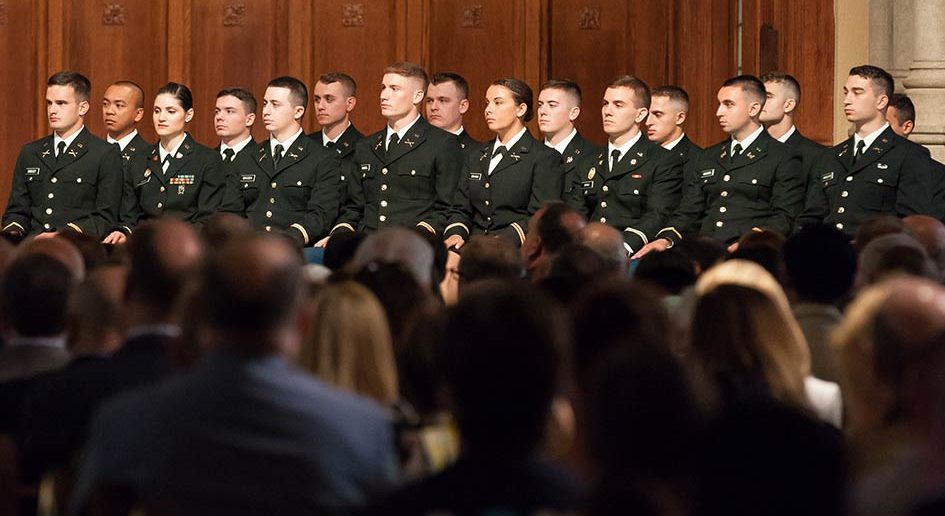The award, which is the Navy’s highest civilian honor, was presented to Byrne by Carlos Del Toro, secretary of the Navy, who said of Byrne, “His unwavering support of our nation’s veterans, paired with his belief in participation and his innovative initiatives and leadership, has greatly enhanced our Department of the Navy’s community engagement. His contributions to our military are incalculable.”
Byrne is the vice chairman of Penske Media Corporation, which owns Rolling Stone, Dick Clark Productions, and South by Southwest, among other brands. He also serves on the boards of numerous nonprofit organizations, including the Intrepid Museum, the USO, and Citymeals on Wheels.
“Being recognized by the U.S. Navy is both an incredible honor and a humbling reminder of the importance of service,” Byrne said at the ceremony, which was held at the Penske Media Corporation headquarters. “Supporting our military and veteran communities is something I consider both a duty and a privilege.”
Supporting Fordham Veterans
Byrne was part of the Marine Corps’ Platoon Leaders Class throughout his college years, and after graduating from Fordham, he served on active duty from 1966 to 1969, with a tour in Vietnam in the final two years of his service.
Throughout his career, which includes stints as publisher of Variety and Crain’s New York Business, Byrne has remained dedicated both to Fordham and to efforts to help veterans—in higher education and beyond. In 2012, he founded Veterans Week NYC to honor and support veterans and their families, and in 2017, he established Veterans on Campus NYC, a consortium of New York City colleges and universities—including his alma mater—with students receiving tuition benefits under the GI Bill.
“Gerry is a staunch supporter of Fordham and Fordham veteran and military-connected students,” said Matthew Butler, senior director of military and veterans’ services at the University. Byrne has donated to academic and other initiatives that help the Fordham veteran community thrive at the University and in their post-military careers, and in 2019, he moderated an on-campus conversation with David G. Bellavia, the first living Iraq War veteran to receive the Medal of Honor.
Byrne was inducted into Fordham’s Military Hall of Fame in 2022, at an event that also marked the 175th anniversary of Fordham’s military legacy, which occurs through the ROTC programs and Fordham‘s commitment to serving veterans and their family members with the Yellow Ribbon program. He is also a former member of the Gabelli School of Business advisory council.
“What I learned at Fordham Prep and Fordham College from the Jesuits was ethics and integrity,” he said at the 2022 gathering. “In the Marine Corps, I learned discipline and leadership. When you combine it, it’s amazing what you get out of it.”
In November, Fordham was ranked No. 1 in New York and No. 23 nationwide in the “Best for Vets” rankings published by Military Times.
]]>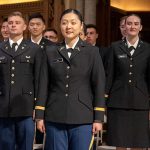
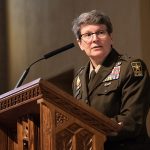
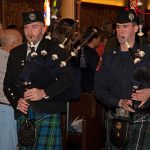
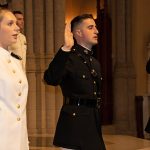
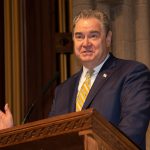
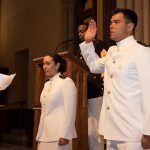
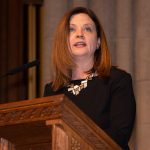
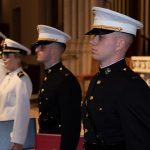
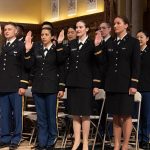 In a May 19 commissioning ceremony, Fordham ROTC cadets began their careers as military officers, spurred onward by a message about the importance of not only training their troops to be fighting fit but also motivating them to do their best.
In a May 19 commissioning ceremony, Fordham ROTC cadets began their careers as military officers, spurred onward by a message about the importance of not only training their troops to be fighting fit but also motivating them to do their best.
“As leaders, your number one job is to inspire your soldiers to be better than they thought they could be,” Major General Deborah L. Kotulich, director of the Army Recruiting and Retention Task Force, told the ROTC cadets in an address. “You’ll be responsible for building cohesive teams that are highly trained, disciplined, and fit, and ready to fight and win.”
“You’ll start,” she said, “by building and promoting climates of dignity and respect, where every soldier in your formation feels a sense of belonging and wants to be a member of your team.”
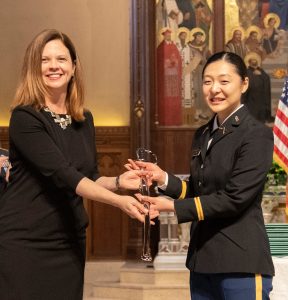
Fordham’s NROTC and ROTC programs held back-to-back commissioning ceremonies at the University Church on the Rose Hill campus. The 20 cadets—five of them NROTC cadets—included students from Fordham as well as other New York-area universities.
Tania Tetlow, president of Fordham, addressed the cadets at each ceremony, and—at the ROTC ceremony—noted the parallels between the military and the Jesuit order, with which Fordham is affiliated.
“Both see talent everywhere, invest in that talent by giving opportunity, and bring together a fierce community bonded by service and by honor,” she said. “You embody our Jesuit mission in your service—to be men and women for others; to be leaders grounded in knowledge, critical thinking, and respect; to be full of courage and willing to sacrifice even your life for another. We are so proud of you.”
Commencement Season
The ceremonies took place the day before Fordham’s University-wide commencement ceremony, its fourth since the coronavirus pandemic disrupted the education of first-year students who were this year’s graduating seniors.
“Dealing with and powering through COVID has been a tremendous training experience in resilience for each of you, whether you look at it that way or not,” Kotulich said at the ROTC ceremony.
She called on the cadets to set an inspiring example that helps the Army cope with a difficult landscape for recruitment. She also spoke of changes in the Army like greater supports for military families and more opportunities for women—noting that she was barred from Ranger School and the infantry early in her career because of her gender.
“I’m proud of our leaders recognizing that those exclusions didn’t make sense,” she said.
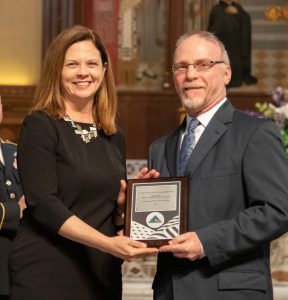
The ROTC ceremony followed the NROTC ceremony, during which John P. Coffey, general counsel of the Department of the Navy, told cadets of the “glorious history that precedes you” as the newest officers in the Navy and Marine Corps.
“Never forget that you have an obligation, at all times, to act with utmost integrity,” he said, advising them to “choose the hard road” when tempted to turn away from a difficult situation and take the easy way out. Also, he said, “know there will be times when you fall down.”
“Pick yourselves up, dust yourselves off, learn from experience,” he said. “No one’s perfect. We don’t live in a zero-defect military. The most important thing is how you learn from it.”
]]>Tradition holds that Fordham’s military heritage dates from 1848, when the state of New York issued Fordham 12 muskets for defense against the threat of nativist rioters, noted Lt. Col. Paul Tanghe, Ph.D., professor of military science at Fordham, at the Nov. 6 event at the Rose Hill campus. Today, the University is home to a military service community comprising “one of the most diverse [ROTC] cadet battalions in the Northeast” and more than 400 students who are veterans, he said, noting the University’s reputation for being welcoming to them.
“The military-connected community is one of the things that makes Fordham special,” he said. “This is a community that’s built around individual paths of service coming together in one place.”
Efforts to honor, support, and grow that community will be part of the yearlong anniversary celebration.
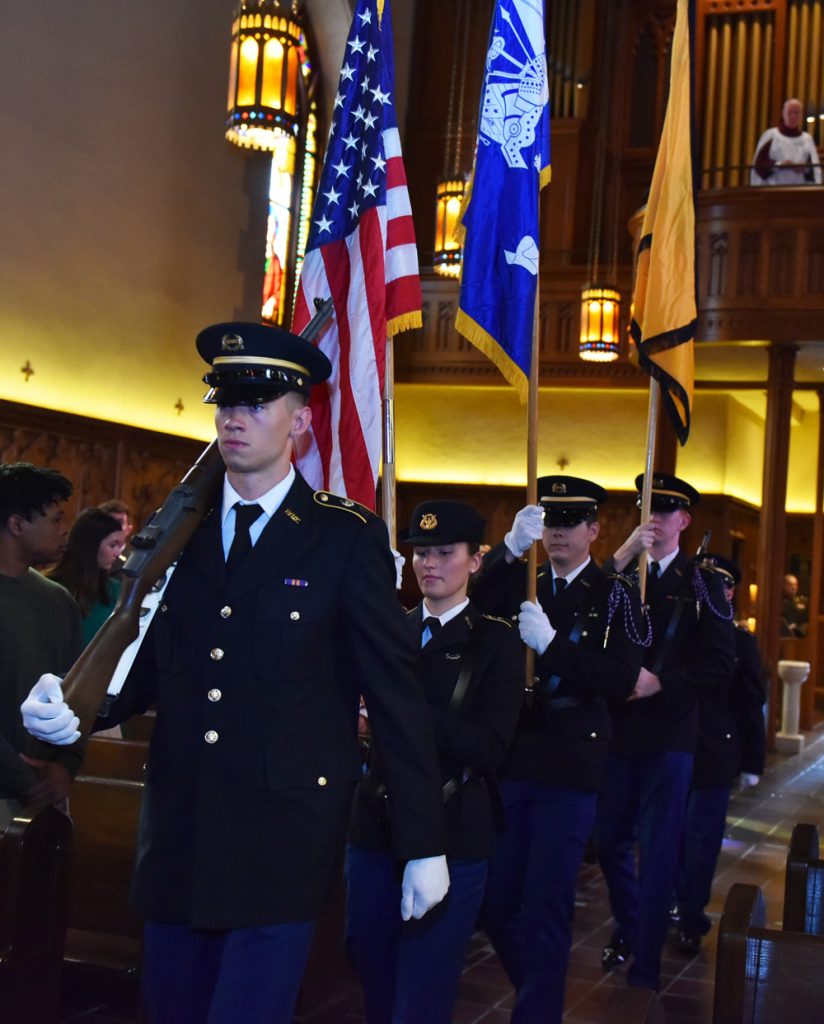
The Office of Military and Veterans’ Services and the Department of Military Science will host two events per month from January through November, with each month’s events organized around a chapter of military history at Fordham. January’s events include a service project—in partnership with Campus Ministry—related to welcoming immigrants, harking back to the origins of Fordham’s military training in 1848. Events in later months will commemorate the Civil War, Vietnam War, World War I, and other epochs, culminating in a gala to be held in November 2023.
There is also a “military muster” outreach effort to Fordham’s military community—ROTC graduates, student and alumni veterans, faculty and staff who served, and friends and family of Fordham veterans—to reengage them with the University. In addition, the veterans’ services office will lead an effort to raise $4.2 million to support ROTC cadets and student veterans as part of Cura Personalis | For Every Fordham Student, the University’s $350 million fundraising campaign.
The veterans’ services campaign received some impromptu support at the Nov. 6 event, which celebrated two distinguished alumni veterans as well as the ROTC program and student-veteran community at Fordham.
Two Who Served with Valor
Attendees included alumni, student veterans, and cadets in Fordham’s ROTC program, a flagship program in the Northeast comprising cadets who attend 17 New York-area schools, from New York University to the Parsons School of Design, Tanghe said.
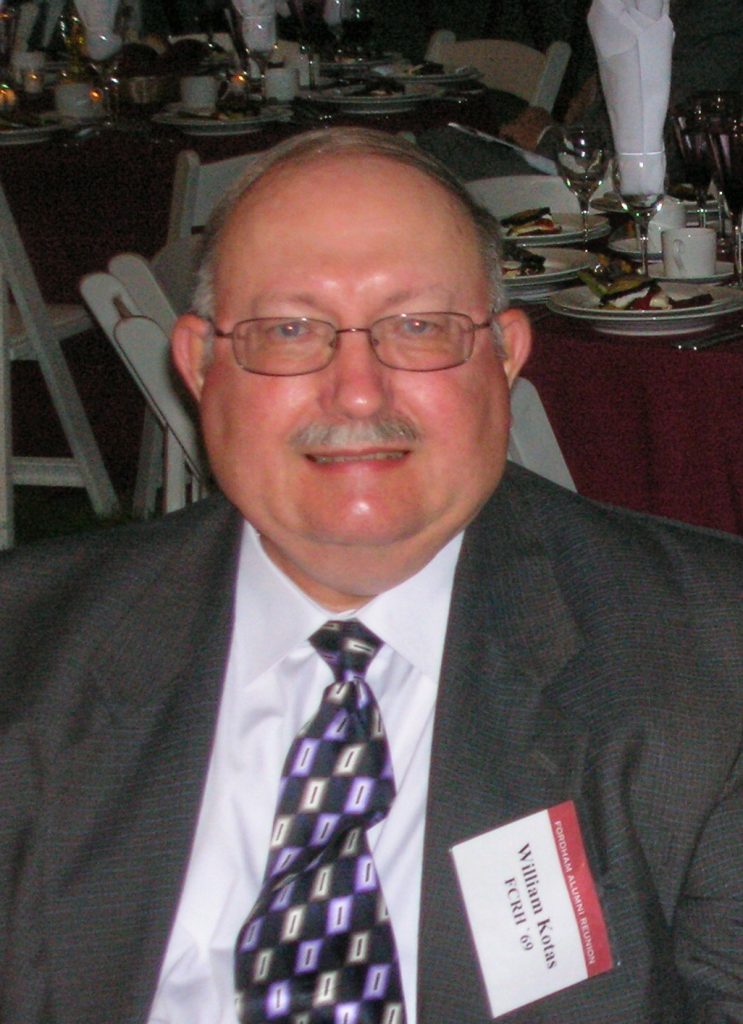
Two alumni veterans were inducted into the Fordham University Military Hall of Fame: William E. Kotas, FCRH ’69, a graduate of Fordham’s ROTC program, onetime U.S. Army captain, and Vietnam War veteran, who was honored posthumously; and retired U.S. Marine Corps Capt. Gerry Byrne, FCRH ’66, a Vietnam War veteran, media executive, community leader, and entrepreneur.
Kotas, who died last year, served as a platoon leader with the 23rd Infantry Division. He was inducted in honor of “the way that he approached all of his duties and obligations to others in his life,” from his cadet years to his post-Army life, Tanghe said.
“His military service was shorter than he wanted it to be because of the manner in which he approached it”—that is, with devotion to the soldiers under his command, Tanghe said.
In a display of that devotion, he personally led a patrol during which he suffered grievous injuries that would require a year of hospitalization and medical retirement from the Army. At the time of his injury, he continued to lead his men and directed them to safety. Kotas received multiple military honors, including the National Defense Service Medal, the Parachute Badge, and the Bronze Star Medal with the “V” device to denote heroism.
Moving back to Nashville, Tennessee, “he continued to find a life of purpose and meaning,” Tanghe said. Kotas was a founding member of the St. Ignatius of Antioch Catholic Church in Nashville and taught in its adult education program on Sundays, among other community activities, and worked for the U.S. Postal Service until his retirement.
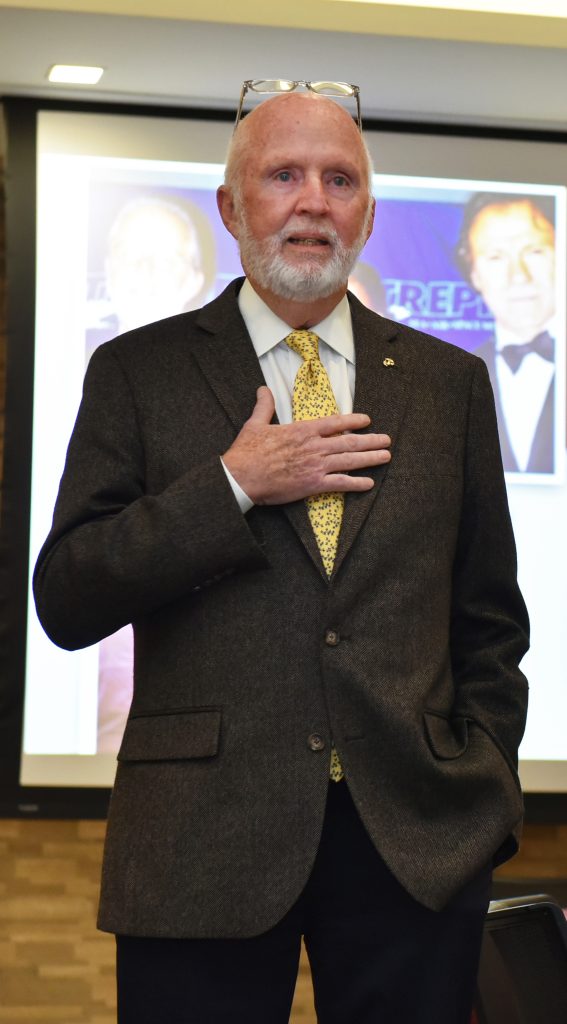
Byrne, a 1962 graduate of Fordham Preparatory School, was commissioned via the Marine Corps’ Platoon Leaders Class, which he attended while earning his degree from Fordham College at Rose Hill. He served on active duty from 1966 to 1969, including a tour in Vietnam spanning the latter two years.
“What I learned at Fordham Prep and Fordham College from the Jesuits was ethics and integrity,” he told the gathering. “In the Marine Corps, I learned discipline and leadership. When you combine it, it’s amazing what you get out of it.”
Byrne has had a distinguished career in media, serving as launch publisher of Crain’s New York Business, creator and chairman of NBC’s Quill Awards, and publisher of Variety, leading its transformation into a diversified global media brand. Today he is vice chairman of Penske Media.
He has hosted a Marine Corps birthday celebration in New York City for the past 25 years, and in 2009, he received the Made in New York Award from then-mayor Michael Bloomberg.
Byrne serves on the boards of nonprofits too numerous to name, including the Intrepid Sea, Air & Space Museum. He learned the value of staying busy, he said, from the famed television producer Norman Lear, who, during a conversation about packed schedules, told him that “life is not a rehearsal.”
“When I go back and think about friends and fellow marines who don’t have the ability to stand here like I am, it’s very moving,” said Byrne, who attended the event with some friends from the Corps and his wife, Liz Daly Byrne.
He said he was “extraordinarily honored” to be inducted into the Hall of Fame “and to be a Fordham graduate, and to see … everyone who’s here today.”
A Fundraising Campaign Begins
The fundraising campaign announced at the event has three components:
- An Emergency Relief Fund to promote wellness for military-connected students and provide loans to help students through financial distress ($100,000 goal)
- An endowment to enrich ROTC cadets’ and student veterans’ education by sending them to events and conferences, bringing guest speakers to campus, and providing gear needed for new training opportunities ($1.75 million goal)
- A drive to create a facility at Rose Hill for student veterans and cadets that promotes inclusion, community, collaboration, and information sharing, in part through new digital resources ($2.3 million goal)
Tanghe noted that the Emergency Relief Fund will provide microloans to help students who, for instance, might be unable to meet monthly living expenses on time, because their veterans’ benefit payments are held up by bureaucratic snafus. “If you’re missing a month of rent in New York City, that can be a significant financial burden,” Tanghe said at the Nov. 6 event.
Matthew Butler, PCS ’17, Fordham’s director of military and veterans’ services, said the fundraising effort has gotten off to a strong start, with one donor contributing $25,000 in mid-October.
During a follow-up meeting, the donor wrote another check, for $70,000, Butler said.
That’s when Byrne spoke up—“Liz and I will throw in the other five” needed to bring the tally up to an even $100,000, he said.
Asked later about his spontaneous decision to donate, he gave a simple reason.
“It’s supporting Fordham and veterans,” he said. “There’s no better reason than that.”
Register here to be connected with others in Fordham’s military-affiliated community.
To inquire about supporting the Office of Military and Veterans’ Services fundraising campaign, please contact Michael Boyd, senior associate vice president for development and university relations, at 212-636-6525 or [email protected]. Learn more about Cura Personalis | For Every Fordham Student, a campaign to reinvest in every aspect of the Fordham student experience.
]]>At the March 16 event at Fordham’s Lincoln Center campus, Funk spent time with students, answering their questions and discussing his role as the head of TRADOC, which oversees the training of Army forces and the development of operational doctrine for the Army. Funk oversees about 500,000 personnel who conduct all of the Army’s education, training, and doctrinal development, and he is one of the four most senior general officers in the Army, reporting directly to the chief of staff of the Army.
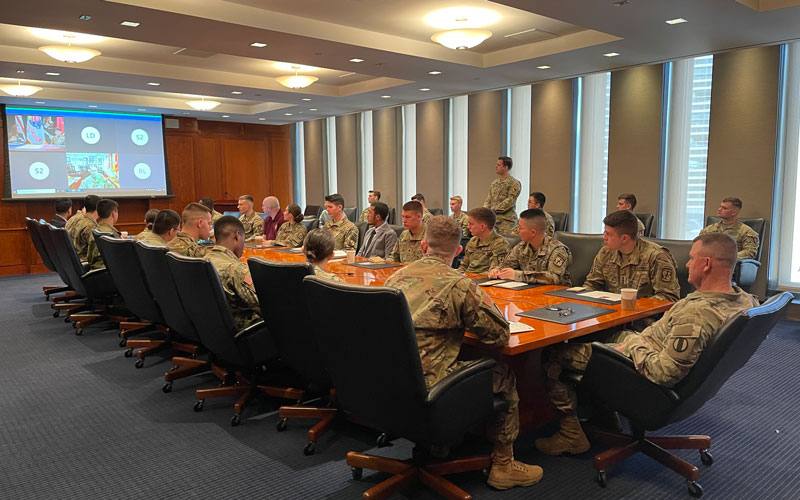
He and the students listened to a livestream event featuring his deputy Lieutenant General Maria Gervais, and the Army’s chief personnel officer, Lieutenant General Gary Brito that addressed the need for cohesive team building.
On the livestream, Funk asked his two lieutenants to share their “Army stories,”—or why they decided to serve—because “nobody cares how much you know until they know how much you care.”
Funk broke down some of the topics discussed, including communication, trust, and the need for hardwork with the students.
“Our job is to do hard stuff and connect people,” he told the students. In order to do that, “we’ve got to overcome things.”
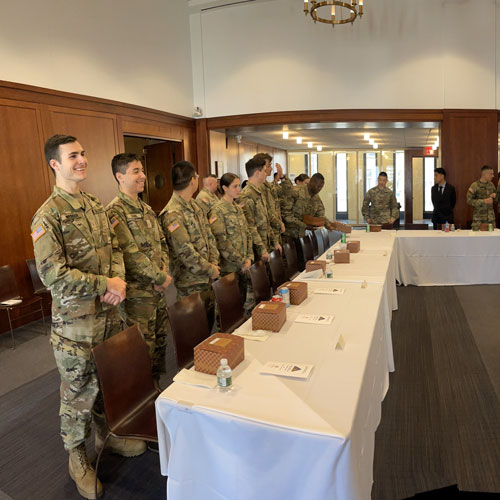
He gave the example of Gervais, who he said wanted to be an example for those she commanded, so she goes to the gym every day at 5 a.m. to work on her physical fitness and stay in top shape.
Funk also emphasized how TRADOC has been changing its communication practices to address the needs of their current officers and their loved ones.
“Now when you communicate with families—it used to be we brought them all into the gym, we laid it all out a bunch of powerpoint slides, and then we left—now you’re talking across continents because our soldiers are far and wide—immigrants from all over the place—and we have to communicate with those families,” he said.
Funk emphasized the need for honest and open communication because without it, he said, “they’re not going to follow you.”
The event was organized by Jennifer Alvarez, assistant professor of military science and head of Fordham’s Army ROTC program. It was Fordham’s first joint-event featuring a four-star general in charge of Training and Doctrine Command, which is the branch that oversees ROTC programs.
]]>Fordham’s Department of Military Science will be presenting a panel discussion, First Response on 9/11, on Wednesday, November 10, from 6 to 7 p.m., in the Moot Court Room 1-01 at the Fordham Law School at Lincoln Center.
The panelists will share their personal experiences as first responders to Ground Zero on 9/11:
- Colonel (Retired) Patrick Mahaney, U.S. Army. A Special Forces officer commissioned from Fordham Army ROTC, Mahaney went onto command the Army’s Asymmetric Warfare Group and now an Adjunct Professor of International and Public Affairs at Columbia University.
- Master Sergeant Eric Sabater, New York Army National Guard. A Fordham ROTC Cadet on 9/11, Sabater went onto a distinguished career in the New York Army National Guard and currently supports ROTC education at Fordham.
- Mr. Matthew McDermott, Journalist. A photographer with the New York Post, McDermott will share photographs from that day.
The panel honors the legacy of 9/11 as part of the Department of Military Science’s 20-year commemoration of the attack. The event is open to all Fordham students, faculty, and staff.
“To our soon-to-be officers, congratulations,” said Jack Keane, GABELLI ’66, a national security and foreign policy expert and Fordham trustee fellow who was the ceremony’s featured guest speaker. Later, he added: “The oath which you are about to take is a sacred trust between you and the American people.”
“We who take it, embrace it, and take it very seriously. I expect you to do the same,” said Keane, who administered the oath of office to the cadets. In his address, he outlined several security threats that he said will continue to challenge the military worldwide, ranging from a resurgent Russia to a belligerent and nuclear-armed North Korea.
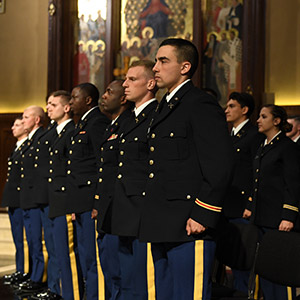
Twenty-two cadets became second lieutenants at the May 17 commissioning ceremony, held in the University Church on the Rose Hill campus the day before Fordham’s 174th Annual Commencement. Another cadet was commissioned on May 20. Nine members of Fordham’s Class of 2019 were among the cadets, who attended a number of New York-area universities.
In his address, Keane told the cadets they are entering not just a job or a career but something “more akin to a vocation” because of the sacrifices and discipline it demands.
Keane noted that he began his own military career as a cadet in the Fordham ROTC program. Following his commissioning, he was assigned to an infantry paratroop unit at Fort Bragg, North Carolina.
It was intimidating. “They were our very best. I did not know if I could measure up,” he said. “The noncommissioned officers, though subordinate to me, were also my teachers. Outside of our beloved Jesuits, they were the most professional and different group of men I ever encountered—smart, confident, totally dedicated, and completely selfless.”
They cared little about his background, he said. “What they wanted to know was, who was I? Was I willing to work hard to learn the necessary skills, did I really care, would my troops truly come first? In other words, they were … more interested in my heart than anything else.”
“I tried awfully hard to earn their respect and trust,” he said. “I eventually became one of them. I lived a life of shared experiences that enriched my life and my family’s beyond expectations.”
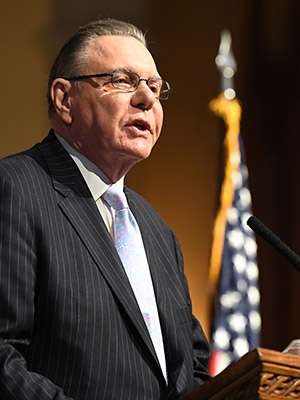
A career infantry paratrooper, Keane was a platoon leader and company commander in Vietnam, where he was decorated for valor. He commanded the 101st Airborne Division and the 18th Airborne Corps, the Army’s largest war-fighting organization, and served as the Army’s acting chief of staff and vice chief of staff before retiring from the Army in 2003. He spoke about the Russia threat before the Committee on Foreign Affairs on May 1, one of many times he has provided expert testimony before Congress.
Keane said the U.S. faces security challenges “on a scale we have not seen since the end of World War II and the rise of the Soviet Union.” They include China’s efforts to dominate the Indo-Pacific region and supplant the U.S. as the world’s leader; radical Islam; and tensions being inflamed by Iran in the Middle East, in addition to the challenges posed by Russia and North Korea, he said.
In light of these threats, along with past defense budget cuts and the erosion of America’s military dominance, the Trump administration’s defense buildup “is even more critical than the Reagan defense buildup of the 1980s,” he said. “The United States military is a much-needed deterrent to these dangers. Your job will be to prepare yourself, your unit and your troops, to be ready.”
“I am proud you want to serve your country,” he said. “We do not take your commitment lightly.”
Protecting America’s Ideals
Speaking before Keane took the podium, Joseph M. McShane, S.J., president of Fordham, reflected on the ideals in the country’s founding documents, calling them “luminously beautiful” but also “inherently fragile.”
“They must be protected, defended, and nurtured in every generation,” he told the soon-to-be-commissioned cadets. “They have called out to you and they have awakened in you the same bold generosity that has marked the lives of our greatest heroes.”
“I admire your courage. I am grateful for your generosity,” Father McShane said. “I am challenged—as I always am when I am in the presence of heroes—by your selfless love of our nation.”
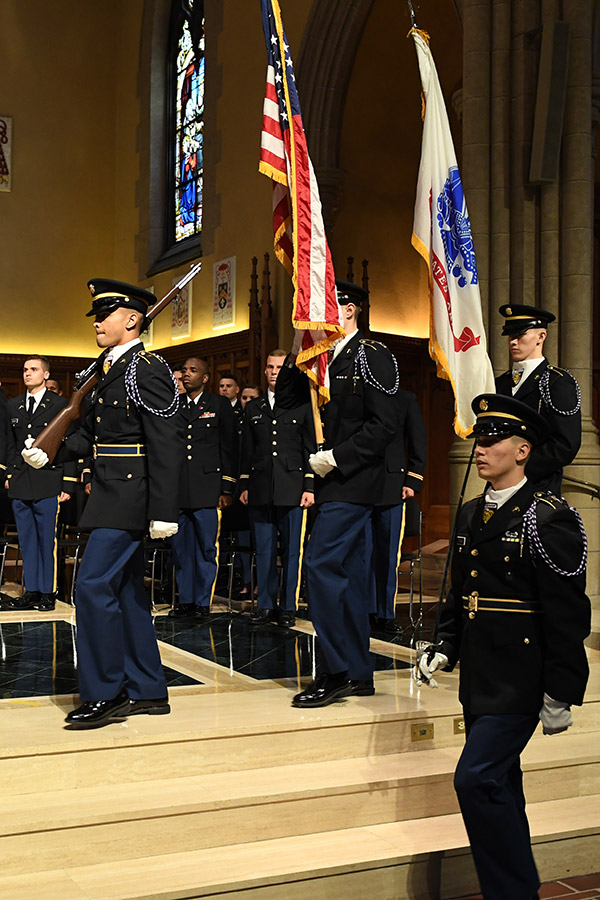
During the ceremony, Father McShane presented Lt. Col. Samuel Linn, professor of military science at Fordham, with a certificate praising him for his “transformative leadership” of the ROTC program over the past three years. Linn is departing for Fort Campbell, Kentucky, to command an artillery battalion.
Two cadets were presented with awards honoring distinguished military graduates: Declan Wollard, GABELLI ’19, received the President’s Sabre, and Chris Bolton of Columbia University earned the General Jack Keane Award.
Also on May 17, two Fordham students earned commissions in the Navy ROTC program based at SUNY Maritime College in the Bronx, and the University held an inaugural Victory Bell ceremony at the Rose Hill campus to honor the veterans among the Class of 2019.
]]>
Mary Ellen Ross, Joanne Grossi, Cheryl Palmer Normile, and Susan Barrera Fay—a Fordham photographer brought them together on graduation day as representatives of their “pioneer class” of 210 graduates, the “first girls to invade the male environs of Rose Hill en masse,” as a University press release put it at the time.
They weren’t the first women to attend Fordham. Women had been earning Fordham degrees in law, education, social service, and other fields for nearly five decades. But they helped initiate a tremendous cultural shift at the University, one that culminated a decade later, when TMC graduated its last class and Fordham College at Rose Hill began accepting women. They challenged themselves and everyone around them—including skeptical faculty and students at the all-male Fordham College—to see beyond boundaries of expectations for women.
Their undergraduate days were also indelibly marked by social unrest—the civil rights and burgeoning women’s liberation movements, political assassinations, race riots, and anti-war protests that shocked and roiled the country.
“It really is hard to have perspective in the moment,” Normile said of being in the first class of TMC amid the “tumult” of the times. “But I think as women, we did have a sense that we were breaking some ground.”
Grossi expressed a similar sentiment. “When we got there,” she said, “we knew it was a big deal.”
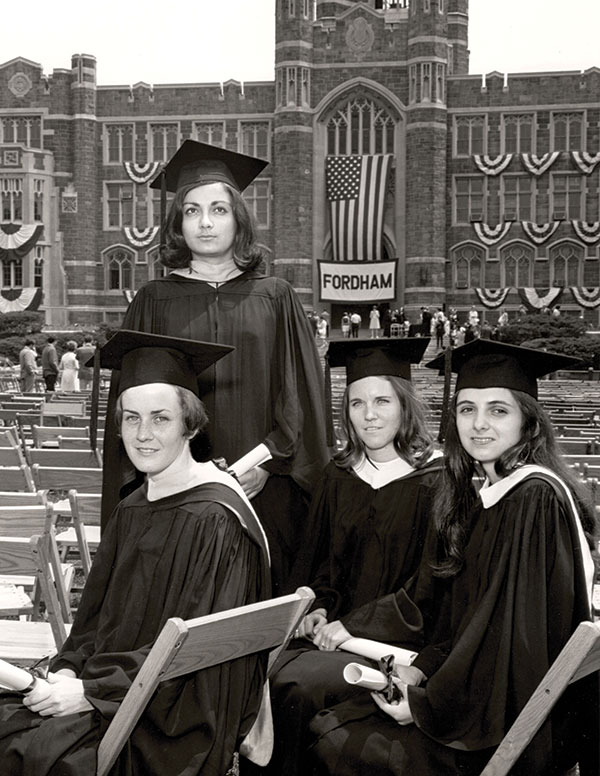
‘She’s Done Well, She Deserves to Go’
Fay first visited Rose Hill for a debate workshop as a high school sophomore. “I thought it was a beautiful campus,” she said. So when she learned that Fordham was opening a college for women, she leapt at the opportunity. Admission was highly selective. In a letter welcoming the first incoming class to the University, Vincent T. O’Keefe, S.J., president of Fordham from 1963 to 1965, admitted, “[W]e don’t even know whether to call you freshmen or freshwomen.” But he praised their academic records: “Your College Board scores are collectively above average.”
Academic requirements were no problem for Fay, but finances were another issue. As the oldest of five children (the youngest was born while she was at Fordham), she wasn’t sure she would go to college at all. “My father said, ‘Maybe you should go to secretarial school, so when you get married and have children, you’ll have something to fall back on if you need it,’” Fay recalled. Not that he was unsupportive, she said, just worried about providing for the rest of the family. “And it was my mother, who had not gone to college, who put her foot down and said, ‘She’s done well, she deserves to go,’” Fay said.
Like Fay, Ross was already familiar with Fordham. She grew up on Perry Avenue in the Bronx, a 15-minute walk from campus, where her brother, Donald, was a senior and the student government president. “We were very different,” he said of his sister. “I was a glad-hander, and she was not, but she was very well organized.” Grossi remembers Ross as warm and well liked, and thinks her proximity to power, as it were, might also explain why she was elected TMC student government president. “There was a lot of, ‘Can you ask Don about it?’ or ‘Who do we see?’” Grossi recalled with a laugh. But the women were often on their own, and Ross felt the challenge of being first. “There was nobody to look up to,” she told the Fordham press office in her senior year. “We had to solve our own problems.”
‘They Were Not Ready for Us’
Most of the women were commuter students, as there were no campus residences for women until fall 1967. Grossi traveled from Jersey City, New Jersey; Normile from Mount Vernon, New York; and Fay from Queens. Ross walked to campus. Grossi’s and Normile’s parents eventually let them live in nearby apartments, both for the experience and, in Grossi’s case, because her science labs were early in the morning.
Some students lived in the Susan Devlin Residence, a Bronx boarding house for working women that was run by Catholic nuns and was so crowded, Grossi said, that some residents had to climb over other beds to get to their own.
“They got us admitted and got us seats in classrooms, but they were not ready for us,” she said, recalling a dearth of ladies’ rooms and places for the women to gather on campus. Funny and outgoing, she succeeded Ross as TMC student government president. She said the administration tried to keep women in separate classes at first, but “in a year or two, we took classes with the men. And I think most of the guys changed their minds and got used to us.”
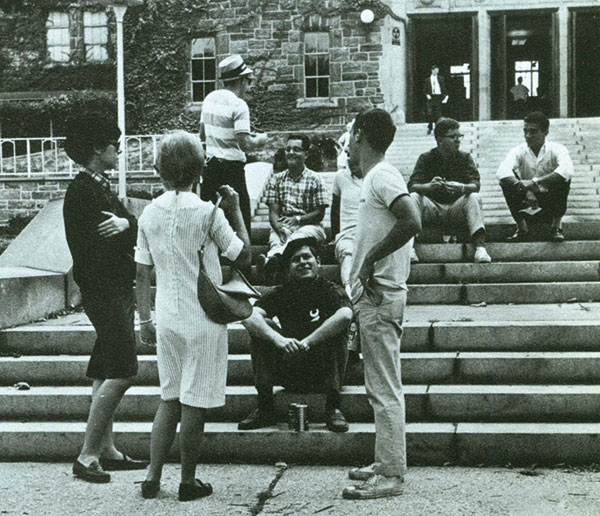 In a history class her first year, Fay was the only woman among about 50 students, she said. She found the last seat, in the back, where she hoped to go unnoticed. No such luck. Her future husband, John Fay, FCRH ’68, came in late and stood behind her, stealing glances at her name on her notebook. “The attempt to keep classes separate broke down quickly,” said Fay, whose facility with Spanish—her father was from Ecuador—landed her in advanced Spanish literature instead of an intro, girls-only section. “I hadn’t had boys in class since the third grade, so it was a bit of an adjustment.” She added with a laugh, “As soon as we got to higher-level classes, they weren’t going to have [separate sections of]Chaucer for boys and for girls.”
In a history class her first year, Fay was the only woman among about 50 students, she said. She found the last seat, in the back, where she hoped to go unnoticed. No such luck. Her future husband, John Fay, FCRH ’68, came in late and stood behind her, stealing glances at her name on her notebook. “The attempt to keep classes separate broke down quickly,” said Fay, whose facility with Spanish—her father was from Ecuador—landed her in advanced Spanish literature instead of an intro, girls-only section. “I hadn’t had boys in class since the third grade, so it was a bit of an adjustment.” She added with a laugh, “As soon as we got to higher-level classes, they weren’t going to have [separate sections of]Chaucer for boys and for girls.”
Normile attended an all-girls Catholic high school and never doubted that she would go to college. She remembers her guilt at skipping class with a friend one day to visit the New York Botanical Garden. “I did it, but it just bothered me,” Normile said of their little adventure, “because I knew the tuition was a lot for my parents.”
‘Beyond Your Own Little World’
The first class of TMC was graduating just as protests against the Vietnam War were dividing campuses, including Fordham’s, where military recruitment became an increasingly contentious issue. “People didn’t want recruiters on campus,” Grossi recalled. “It was a difficult time.” Fay’s boyfriend (later husband) joined the ROTC because he figured it was better to go into the Army as an officer than to be drafted. “It was a looming reality,” Fay said of the war. Her husband was not deployed to Vietnam, but many Fordham alumni were: 23 of them were killed, including four members of the Class of ’68, one of whom, Staff Sgt. Robert Murray, FCRH ’68, was posthumously awarded the Medal of Honor.
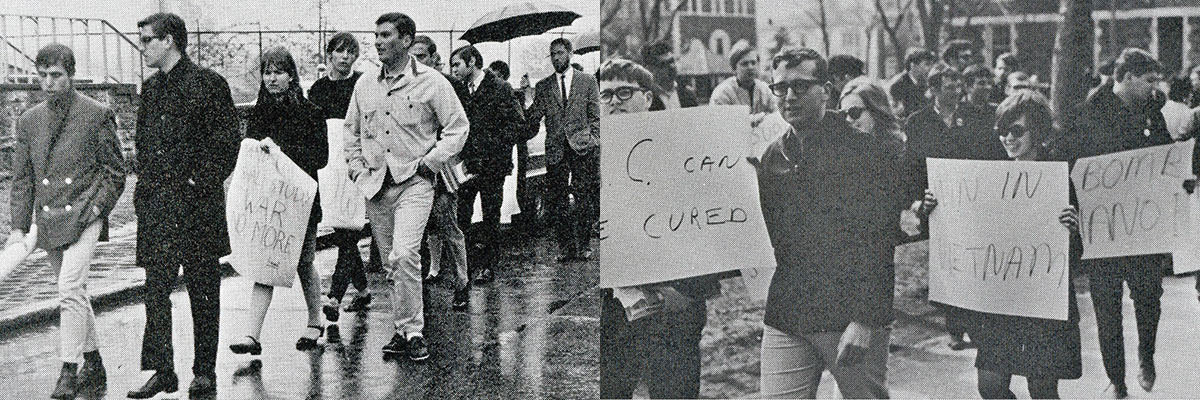
Normile recalled it as “a tense time, a disturbing time. But I think that kind of disturbance makes you think beyond your own little world,” she said, adding that a Jesuit education helped provide “a bigger balance” because it “encourages questioning, thinking, and exploring, and students were doing that on a much bigger level.”
Fay had an experience that took her out of her familiar world when she joined two mission trips to a sugar mill town in Mexico during the summers after her sophomore and junior years. She taught English classes there and lived in the parish rectory.
“It was an eye-opening experience for many of us, these privileged American kids going down to this little community where children had bloated stomachs and were walking around barefoot,” she said of the trips, which grew into the University’s Global Outreach program. “I think my attitude toward political and economic issues was shaped in part by seeing how people struggled to survive in Mexico,” she said, adding, “I also discovered I knew how to teach.”
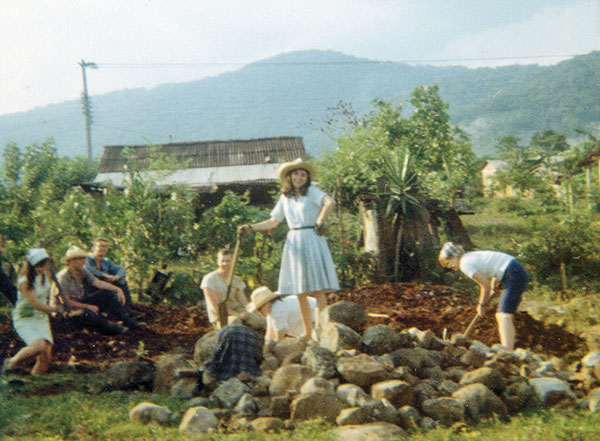
Life After Thomas More
Fay and her husband were married in the University Church the year after graduation, and following moves to Hawaii, Chicago, North Carolina, and Texas, they eventually settled in Reston, Virginia, where they raised two children. She earned a doctorate in English from George Washington University and taught at Marymount University for 31 years before retiring in 2011.
Grossi majored in biology but also had a knack for computer programming. She worked in data processing at Con Edison and then at Chase Manhattan Bank, but both jobs proved unfulfilling, and the constant stress led to gastrointestinal troubles. The only thing that helped was visiting a chiropractor. “Even though people thought they were quacks, it worked for me,” said Grossi, who was so impressed she started chiropractic school herself in 1973 and became a practitioner. She retired on full disability in 1992 after being diagnosed with Lyme disease and lupus. “It’s very difficult, when you’re still in your early 40s, not to have a profession anymore,” Grossi said. “What do you do?” Volunteer work with the local YWCA is one thing that has kept her engaged.
Ross earned a Ph.D. in psychology at Syracuse University and was a professor of psychology and women’s studies for 30 years at St. Olaf College in Minnesota, where she found her niche.
Donald Ross remembers when he learned just how much of a difference his sister had made in the lives of her students. He was in Anchorage, Alaska, working on a juvenile justice project, and the administrator of a prison facility there had a St. Olaf mug on her desk. He asked her about it. She was an alumna, and she had known his sister. The woman began to cry when he told her that Mary Ellen had died, from Alzheimer’s, at age 66. “She said, ‘Your sister was so inspirational to all of the young women there, and treated us so well,’” he recalled.
Normile pursued a journalism career, which led to her becoming, she believes, the first female speechwriter on the staff of the secretary of the U.S. Department of Agriculture. Being a groundbreaking woman in the federal government in the 1970s meant facing sexist attitudes, despite holding a master’s degree from American University, Normile said. She left the USDA in 1981, got married, and later spent two years working on the Democratic Study Group of the U.S. House of Representatives before taking time off to raise two daughters and care for her parents. She returned to the USDA as a speechwriter in 1992, retiring in 2015. Her husband, Michael, died that same year.
Looking back, she attributes her decision to become a writer in part to William Grimaldi, S.J., a Fordham classics professor who encouraged her to go to grad school. “It was because of him that I came to D.C.,” she said.
Fay was also friends with Father Grimaldi—he presided at her wedding and baptized her children. Years later, when he was visiting the Fays at their home, they fell into conversation about the impact of women at Fordham. They reminisced about those days when everyone was navigating unfamiliar waters, students and Jesuits alike.
“He had thought it was not a very good idea” at the time, Fay said, “but over the years, he realized it was the best thing that happened to Fordham.”
—Julie Bourbon is a writer and editor based in Washington, D.C.
]]>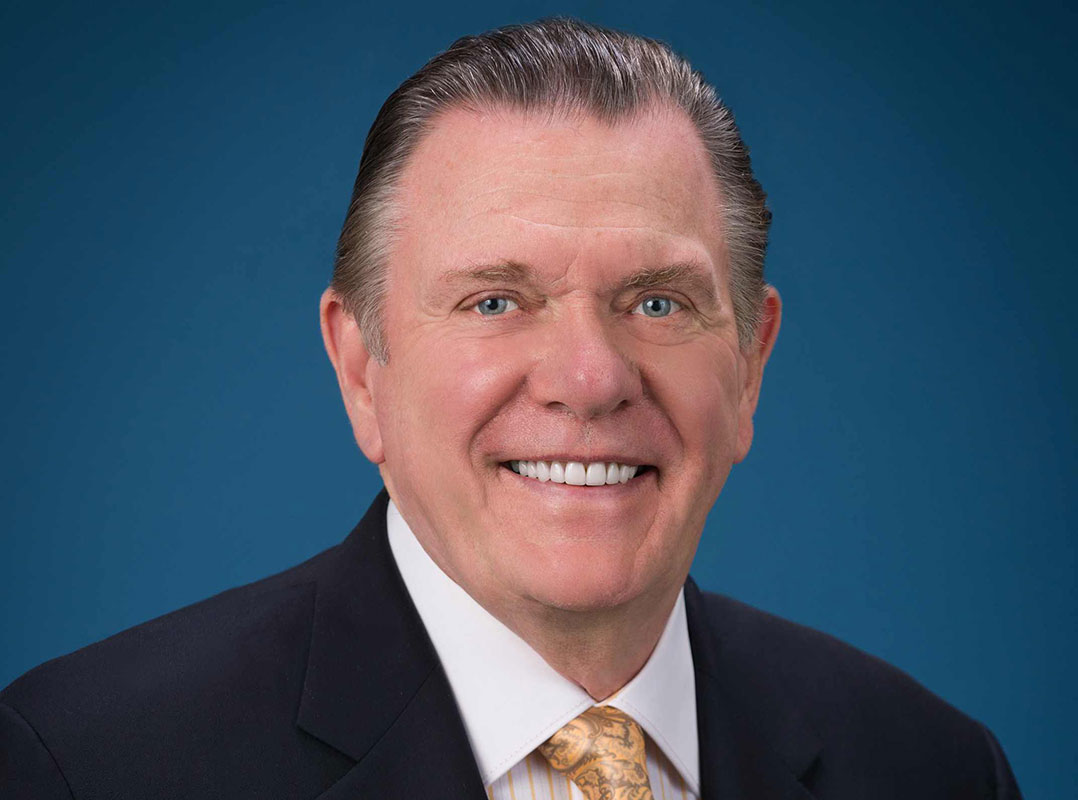
In The Gamble, his 2009 book on the Iraq War, Pulitzer Prize-winning journalist Thomas Ricks described Jack Keane, a retired four-star general, as “crackerjack smart and extremely articulate, often in a blunt way. Most importantly … he is an independent and clear thinker.”
Keane began his military career at Fordham as a cadet in the University’s ROTC program. He graduated in 1966 with a bachelor’s degree in accounting and went on to serve as a platoon leader and company commander during the Vietnam War, where he was decorated for valor. A career paratrooper, he rose to command the 101st Airborne Division and the 18th Airborne Corps before he was named vice chief of staff of the Army in 1999.
Since retiring from the military in 2003, Keane has been an influential adviser, often testifying before Congress on matters of foreign policy and national security. In late 2006 and in 2007, he was a key architect of the surge strategy that changed the way the U.S. fought the war in Iraq. He is a trustee fellow at Fordham; a member of the board of directors of General Dynamics, an aerospace and defense company; and chairman of the board of the Institute for the Study of War, a Washington, D.C.-based think tank that monitors global conflicts. He’s also a senior national security analyst on Fox News.
Keane spoke with FORDHAM magazine about service, leadership, and whether or not his loyalties will be divided on Sept. 1, when Fordham football opens its 2017 season with a game against Army at West Point.
What inspired you to join the Army?
I joined the ROTC program essentially because the country was at war and we knew that we would likely be joining it. In the mind of myself and my friends, it made sense to do that as officers, although none of us had ever had a family member who was an officer. Then, as part of the ROTC program, I joined the Pershing Rifles [national military society] because they seemed more confident and accomplished than the other participants in ROTC.
We took basic marksmanship training, and we would go to Camp Smith and practice patrolling techniques and other tactics under the supervision of active-duty officers. That gave me some exposure to what I thought the Army would be like. By the time I graduated, I came to recognize that I had an aptitude for it. And I liked the idea of serving the country.
I saw an interview you did a few years ago with Bill Kristol. You told him about a conversation you had with a Jesuit around the time you were graduating from Fordham. Who was that Jesuit and what did you two talk about?
I think it was Father [Thomas] Doyle, [then an assistant professor of philosophy], but I’m not sure. He asked me what I was planning to do, and I said, “I’m going to go in the Army.” He said, “No, I mean, after the Army.” I said, “Well, I’m thinking about maybe making a career out of it if I’m capable and if I like it to the degree that I think I will.” He said, “Why would you do that? You have so much more to offer.”
I said, “Well, Father, have you ever been associated with the Army? Were you a chaplain?” He said no. I said, “Well, I’ve spent a lot of time around it and people who serve in it, and I don’t think it’s necessarily what you think it is. I think there’s an incredible amount of opportunity for growth and development as a human being. I think I’ll have the freedom of thought and the opportunity to be very challenged, and I think that will lead to a growth experience for me.”
That turned out to be the case.
The way you describe the Army, in terms of opportunities for growth within a strict organizational structure, could also be applied to the Jesuits, I would think. You went to Catholic schools before Fordham, but was Fordham your first encounter with the Jesuits?
I told my new Army friends that after 16 years of Catholic education, the transition to the Army was very smooth! I think of Fordham and the Jesuits as a transformational experience. The rigor of the Jesuit methodology was evident in all classes. What they were least interested in is regurgitation of information. What they’re most interested in is critical thinking based on analysis and some rigorous method of interpretation using reasoning.
That was challenging because it was completely different than my Catholic high school. I thought college was just going to be high school on steroids. At Fordham, it was quite something else. The whole learning process was about your own growth and development as a human being—not just intellectually but also morally and emotionally. I don’t think I would have been as successful as a military officer if my path didn’t go through Fordham University.
Would you talk about your approach to leadership and how it has evolved since your days as a platoon leader? Are there certain qualities that you feel all effective leaders share?
First of all, there are very few natural-born gifted leaders. Most leaders learn from experience. If you’re in the United States military and you start out as a second lieutenant platoon leader with 40 people, your life from that moment on is a leadership laboratory. You have plenty of opportunity to learn and also to observe leaders who are very effective.
When you really get down to it, what you’re doing is motivating and inspiring others to reach their full potential and to do that collectively as an organization. Whether it’s a small team or a large team, the opportunity to learn and to grow is really quite extraordinary.
Some of that for me was in combat, which is such an extraordinary human experience. Everything that you are as a person—your character, your intellect, your moral and physical courage—is brought to bear under significant stress. People’s lives are dependent on you. You’re not only there to protect the civilian population and protect your own soldiers; you’ve been given the authority to take lives. The moral underpinning for something like that is really quite significant. I think having had 16 years of Catholic education and participating at Fordham, where I took four years of theology and four years of philosophy, which were my favorite courses, by the way, really provided me with the wherewithal not only to cope with combat but to perform to a high standard.
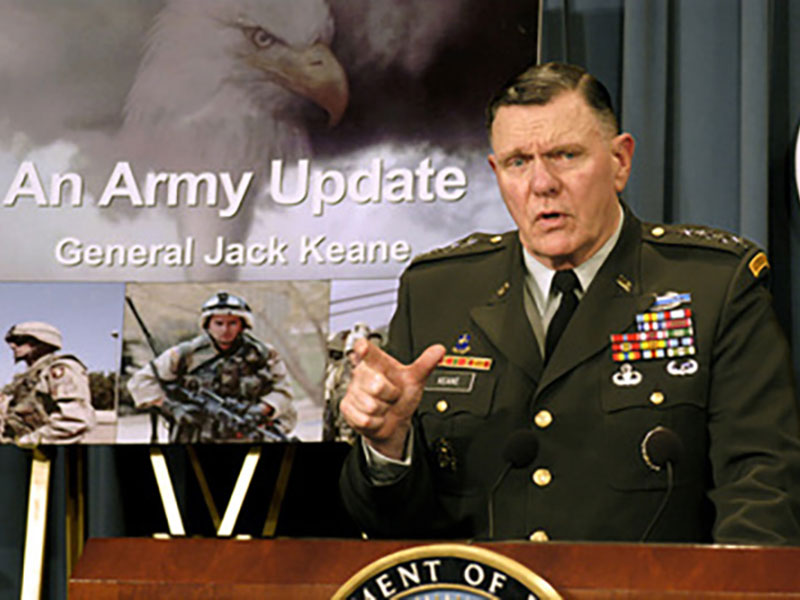
With regard to leadership, anybody can make a list of attributes leaders have to have—integrity, judgment, moral underpinning, et cetera. But there is one attribute that’s always stood out for me, and that’s perseverance. You have to persevere to accomplish the mission. Whether that’s in a stressful situation like combat or in other environments, perseverance really can be very defining because there are constant impediments and obstacles. You see people, not just in the military but in all walks of life, who because of those obstacles and impediments accept something less. They could continue to drive on. Most of the time, it’s more about mental toughness than it is about physical toughness.
Two years ago, Fordham ROTC established the General Jack Keane Outstanding Leader Award, to be given each year to a graduating cadet. What does that award mean to you, and what advice do you give newly commissioned officers?
I was honored to give out the first General Jack Keane Award [at the University Church in 2015]. And I was quite humbled by it, to be frank, when I got my head around the fact that they will always give this award to somebody who is outstanding as a cadet and likely more outstanding than I was.
I’ve always told my officers and my generals that we’re in leadership positions because we know how to lead effective organizations; we get results. But our legacy is not how well we run these organizations, because there’s another guy or gal standing behind us who could run it even better. The real legacy is the growth and development of the people in these organizations. If you focus on their growth and development, and if you have programs that support that, the organization will take care of itself. The organization will actually blossom because the people in it are so committed to it and have a very high degree of satisfaction. That is your legacy.
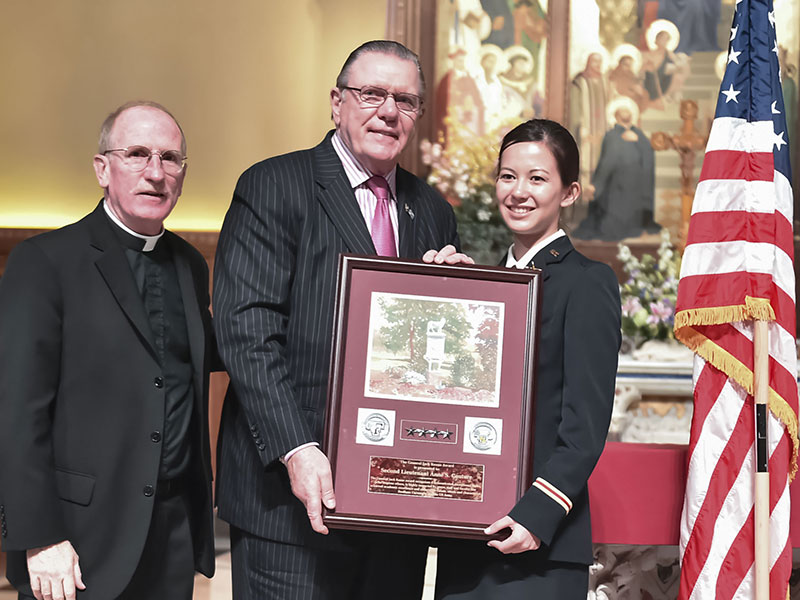
What’s the best piece of advice you’ve ever received?
It came from a sergeant major. I was a major at the time. I was very intense, working very hard, and I was a little frustrated with my boss, my battalion commander, who wasn’t paying attention to all the things I thought he should be paying attention to. The sergeant major closed my office door and said to me, “Major, I know you’ve got some things that are bothering you. I want you to know just one thing: You’re responsible for your own morale.” He looked at me and said, “You got it, sir?” I said, “I got it, sergeant major, thank you very much.”
I never forgot that. It was sound advice.
Fordham football is playing Army at West Point on September first. Who will you be rooting for?
I’m going to miss the game, unfortunately, but good Lord, I want to beat those guys. When I go to West Point for the game, I usually talk to the corps of cadets about the U.S. global security challenges: the Middle East, Russia, the problems with Al Qaeda and ISIS, et cetera. After I spoke a couple of years ago, the first question I got was from a cadet. He said, “General, so we understand you went to Fordham University. You spent almost 40 years in the Army, and you spent only four years at Fordham, so I’m assuming you’re rooting for Army.”
He was just having fun with me, but I looked at him. I said, “Are you kidding me? You know damn well who I’m rooting for tomorrow, OK? I’m rooting for my alma mater.”
So yes, I want both teams to play well, certainly, but I definitely want us to win.
Interview conducted, edited, and condensed by Ryan Stellabotte.
]]>“This University has led the way in graduating men and women of strong character” for 175 years, and has “contributed immensely to the fabric of our nation’s history,” said the guest speaker, retired Lt. Gen. Mary Legere, former senior advisor to the secretary of the Army and the Army chief of staff.
Members of this year’s ROTC class—drawn from a number of area universities including Fordham—will enter occupations ranging from finance and intelligence to engineering and infantry.
The General Jack Keane Outstanding Leader Award was bestowed on cadet Esther Kim, GABELLI ’16, one of only 13 women commissioned this year to be chosen for the Army’s armor branch, which, along with infantry, was opened to women in January.
]]>
Between his time in the Army and his banking career, Calero has worked all over the country and the world. But he never lost sight of the Jesuit principles he grew up on.
“I remained somewhat idealistic about what you can do in life,” he says. “I felt banking could be changed to meet the needs of everyone, not just a subset.”
As president and CEO of TIAA-CREF Trust Co. FSB, Calero has been tasked with creating a bank for teachers, academic communities, hospitals, and other service-oriented professionals, offering mortgages and additional products to help them meet their financial needs. “This is really about helping the difference makers,” he says.
That sense of nobility Calero brings to his work is something he encountered both in the military and in his Jesuit education at Fordham.
“There’s just a value system in both,” he says, whether that system is based on the teachings of Jesus Christ or the U.S. Constitution. “There is a cause greater than yourself,” he adds, noting the “values of courage and selfless service that don’t always exist elsewhere.”
Three years into his first contract with the Army, Calero applied for an ROTC scholarship. He got a call from Fordham and was soon studying economics at Fordham College at Lincoln Center, a few miles from where he grew up on 132nd and Broadway.
Calero says he’s grateful for his Fordham education, not only because of what he learned but of how he learned it.
“It’s not just learning basic skills. It really is critical thinking. Well before you learn something, I think the Jesuits teach you why you should know it,” he says. “You become a continuous learner, where you see learning all around you. It doesn’t just start or stop in the classroom. You spend your whole life learning.”
Right after his Fordham graduation, Calero entered the Army again, separating in 1997 as a captain. “I thought that was it,” he said. Then he got a letter after 9/11. He was promoted to major and sent to Pakistan for 14 months.
During his first stint in the Army in the 1980s, he deployed to Honduras after completing Special Forces training and becoming a Green Beret. It was a time when civil wars and revolution wracked that nation’s Central American neighbors. His experiences in the region played a big role, he says, in understanding the Latin American countries where he did business with Citibank in the late 1990s.
“I would go to every Latin American country and assist with business models, and you recognize that every country is different. Some just did not have a middle class. So how do you grow your business model based on the population?” he said, citing one of many challenges.
His banking career also took Calero to Texas (where his son attended a Jesuit high school), Florida, and most recently, Portland, Oregon, where he was executive vice president of community banking for Umpqua Bank. He returned to New York in 2013 with his wife, Nancy, whom he met in the sixth grade, and their three children.
Calero is one of the newest members of Fordham’s President’s Council, a group of professionals and philanthropists who are committed to mentoring Fordham students, funding key initiatives, and raising the University’s profile. Last year, he mentored a Fordham ROTC student who will be commissioned in May and will go on to active duty. He said he “wanted to do more than donate” to the University when he came back to New York because of the sense of service that Fordham helped instill in him long ago.
“Whether I was the Puerto Rican kid from the Upper West Side or the recent vet,” he says, “Fordham has just always been there.”
]]>
